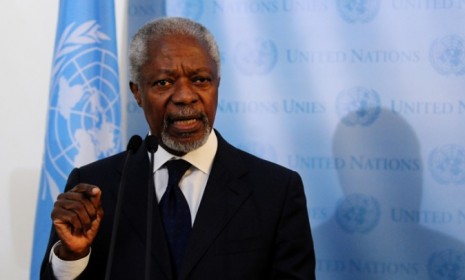Kofi Annan's peace plan: Will it end Syria's bloodshed?
Syrian President Bashar al-Assad agrees to an ambitious deal to end his country's deadly conflict — but stops short of offering to step down

A free daily email with the biggest news stories of the day – and the best features from TheWeek.com
You are now subscribed
Your newsletter sign-up was successful
After more than a year of deadly conflict in Syria, President Bashar al-Assad agreed Tuesday to a six-point peace plan drafted by U.N. special envoy Kofi Annan. Annan hailed the move as an important first step, but conceded that he faces a "long and difficult task" in ending the fighting — after all, the deal doesn't require Assad to step down. Here, a guide to the peace plan, and what could happen next:
What exactly is in this peace plan?
Under the deal, Syria agrees to six things: (1) Work with Annan to "address the legitimate aspirations and concerns of the Syrian people"; (2) Stop the fighting, and the use of heavy weapons in populated areas, with the intention to end all violence; (3) Allow a two-hour daily pause in other fighting to allow humanitarian aid and evacuation of the injured; (4) Release more prisoners that the regime has "arbitrarily detained"; (5) Allow journalists to work in the country freely; and (6) Respect "the right to demonstrate peacefully."
The Week
Escape your echo chamber. Get the facts behind the news, plus analysis from multiple perspectives.

Sign up for The Week's Free Newsletters
From our morning news briefing to a weekly Good News Newsletter, get the best of The Week delivered directly to your inbox.
From our morning news briefing to a weekly Good News Newsletter, get the best of The Week delivered directly to your inbox.
How much of this will Assad actually do?
While former U.N. Secretary General Annan sees Syria's agreement as a crucial step, some Western diplomats remain skeptical. "We have to remain cautious," Peter Wittig, Germany's ambassador to the U.N. tells Bloomberg. Syria has a history of "credibility gaps." Indeed, even as Syria agreed to the deal, troops loyal to President Assad crossed into Lebanon to fight rebels who had taken refuge there. Assad also visited the city of Homs, where his forces have recently taken control, to make the point that he can now tour the streets of "the once bitterly fought-over district."
And Assad won't resign?
It doesn't look like it, particularly because Annan's deal focuses far more on saving civilian lives. More than 9,000 people have been killed in the uprising, and as Syrian National Council spokeswoman Basma Kodmani tells the BBC: That has to stop. "We would like to see protection of civilians," says Kodmani. "If there is a possibility even of two hours of truce to begin with, I think we welcome that, and we will certainly work to make that succeed."
A free daily email with the biggest news stories of the day – and the best features from TheWeek.com
Sources: Associated Press, Bloomberg, BBC, Reuters